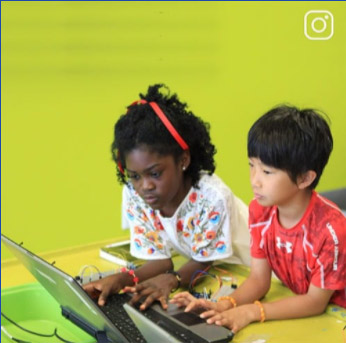You’ve probably already heard it—your kids should learn code! But why? What’s the big hype around coding? Does my child really need to learn code if they’re not going to be a software engineer?
Code offers two huge benefits to your child. First, code is inherently useful to students throughout their education (and their career). Second, code teaches kids skills and thinking patterns that serve them in other disciplines and activities.
Below, we’ve broken these two benefits down into some of their most important parts. Here are the seven reasons that IDEA Lab Kids teaches our students to code:
1. Coding is useful in every field, from science to art. Whether your child wants to study medicine or animate movies, they will probably rely on code to get their work done. Code isn’t just about computing and calculating. It’s how you tell a digital tool what you want to do! Code tells computers how to recognize weather patterns based on images, or how to stop a video game character when they run into a wall.
2. Code is a global language. Some of us see the word “code” and start thinking of complicated symbols and numbers. But really, code is just a language spoken by computers—and by the people who use them. Like any language, it has vocabulary, syntax, and semantics. Coding helps kids not only communicate in a computer language, but also helps them learn and understand other new languages.
3. Coding applies mathematical skills in a “real world” context. Has your child ever complained about trigonometry like this? “But I’ll never even use this in the real world!” Well, here is where your child will use “real world” math. Coding teaches students how to apply math conceptually to achieve goals instead of just crunching numbers like a calculator. This can bring even the most reluctant math students to truly enjoy math, once they understand its utility.
4. Coding teaches creative problem-solving. An empty script field is a blank canvas. Kids use code to solve open-ended problems without prescribed solutions. When coding, students carefully consider the necessary steps and potential pitfalls to solve a problem. Unlike solving an algebraic function or analyzing a poem, there are no rules to follow when devising a solution with code. This mimics real world problem-solving and encourages kids to try new things. Which leads us to our next point…
5. Coding encourages students to experiment and take risks based on logic. Coding requires an “if-then” approach and algorithmic thinking. The coder has to account for a variety of possible inputs, then generate outputs based on those inputs. Sometimes unpredictable scenarios will arise and things won’t work. But by experimenting and discovering new outcomes, your child can become a proficient programmer.
6. Coding builds perseverance, resilience, and patience in the debugging process. In those instances where the code doesn’t work… try, try again! Coding requires “debugging” whether you’re a beginner or a professional. This means that sometimes things don’t work as expected, and you have to make small edits repeatedly until things work the way you want them to. This process can be frustrating, but it fosters patience and resilience for your child. And when the code finally works, the product is all the more rewarding!
7. Coding produces fun, meaningful results that build confidence. With options more limited this year than ever, coding offers a creative outlet that can be accomplished entirely on your child’s computer. A short game or program can be designed, built, and shared with friends all online. Your child’s agency and power are uninhibited by coding, and they will be proud to show off the results of their hard work.
Coding is an empowering skill, and it will open up new opportunities for your child both academically and professionally. If nothing else, coding can be a fun hobby that builds vital life skills! If your child is ready to take the next step in their coding journey, check out our coding programs at your nearest IDEA Lab Kids location!






